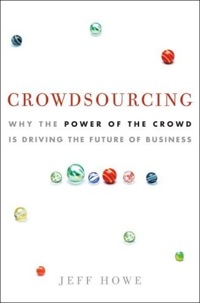 [Here’s the first response in this month’s Lab Book Club. We’re reading Crowdsourcing by Wired writer Jeff Howe; Tommy Tomlinson responds below to the first three chapters. See here for more about the Lab Book Club. —Ed.]
[Here’s the first response in this month’s Lab Book Club. We’re reading Crowdsourcing by Wired writer Jeff Howe; Tommy Tomlinson responds below to the first three chapters. See here for more about the Lab Book Club. —Ed.]
Two guys who make a mint in the T-shirt business by letting customers vote on the designs. A struggling punk band that finds salvation on Myspace. Amateur shutterbugs all over the world who create a massive (and cheap) archive of stock photos.
These are heroes of Jeff Howe’s book — a chronicle of the ways that part-timers, hobbyists and semi-pros can team up to do a lot of things better and faster than people who get paid to do those things.
Or, more to the point, people who used to get paid to do those things. Which is where we journalists start to get a chill at the base of the spine.
Howe doesn’t deal with journalism much in the first three chapters (he tackles it more directly later on). But it’s clear how the inexpensive and intuitive tools of the Web can gnaw away at the media franchise. Back home in Charlotte, a local blogger has been covering crime in more detail than our paper or the local TV stations — and that was before EveryBlock came to town.
But let’s set aside the Big Troubles of journalism and think about more practical questions: How can journalists make a living when so many people are happy to do it for free? And what types of journalists stand the best chance to survive in a crowdsourced world?
Although he doesn’t say so flat-out, I think Howe’s book gives hope to two kinds of journalists. Let’s call them the Renaissance freelancer and the hyper-expert.
The Web is made for dabblers, and it seems to me that someone with lots of different journalism skills can cobble together a career more easily than ever before — writing a little here, editing a little there, taking a few photos, doing a little Web design. And maybe supplementing that with work that isn’t journalism-related at all — after all, someone has to make all those butter sculptures.
And even though the crowd is smarter than the typical individual, there will always be a need for individuals who have insight above and beyond the crowd. Maybe that insight is special expertise; maybe it’s a voice that stands out; more likely it’s a combination of both.
So the Renaissance freelancers and the hyper-experts have nothing to worry about from the media revolution. Problem is, that doesn’t include most journalists.
The people I worry about most are the moderately, narrowly gifted – the cop reporter whose sourcelist can’t match the data from a dozen blogs, the movie reviewer who doesn’t divert you from Rotten Tomatoes, the editors and photogs and artists who do work that keeps them in the business, but nothing more.
The business is disappearing in the crowd. And those folks are in trouble.
Tommy Tomlinson is a Nieman Fellow at Harvard, a columnist for The Charlotte Observer, and a former Pulitzer finalist.